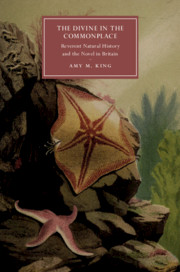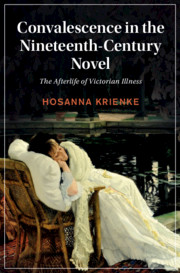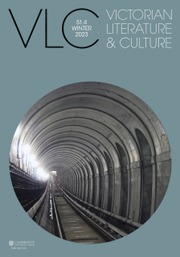The Divine in the Commonplace
Reverent Natural History and the Novel in Britain
£90.00
Part of Cambridge Studies in Nineteenth-Century Literature and Culture
- Author: Amy M. King, St John's University, New York
- Date Published: July 2019
- availability: Available
- format: Hardback
- isbn: 9781108492959
£
90.00
Hardback
Other available formats:
Paperback, eBook
Looking for an inspection copy?
This title is not currently available on inspection
-
Realism has long been associated with the secular, but in early nineteenth-century England a realist genre existed that was highly theological: popular natural histories informed by natural theology. The Divine in the Commonplace explores the 'reverent empiricism' of English natural history and how it conceives observation and description as a kind of devotion or act of reverence. Focusing on the texts of popular natural historians, especially seashore naturalists, Amy M. King puts these in conversation with English provincial realist novelists including Austen, Gaskell, Eliot, and Trollope. She argues that the English provincial novel has a 'reverent form' as a result of its connection to the practices and representational strategies of natural history writing in this period, which was literary, empirical, and reverent. This book will appeal to students and scholars of nineteenth-century literature, science historians, and those interested in interdisciplinary connections between pre-Darwinian natural history, religion, and literature.
Read more- Brings the popular Victorian genre of natural history into greater critical prominence as both a scientific contribution and a non-fiction genre with literary attributes
- Examines how Victorians observed commonplace nature as both an act of scientific observation and reverence
- Explores the connection between the novel and a theological understanding of nature, and the way in which the novel may express theology in altered forms
Reviews & endorsements
'In this elegantly written study of the relationship between nineteenth-century natural history, natural theology, and the English novel, King has shown how all three are designed to celebrate the commonplace. Rather than reading this as a sign of the advance of a secular empiricism, King brilliantly explores how the focus on the ordinary, the hallmark of English provincial realism à la Austen, Gaskell, Kingsley, Trollope, and Eliot, is actually indebted to the reverent form of natural history.' Bernard Lightman, York University
See more reviews'Amy King's The Divine in the Commonplace marks a quiet but major revision in our thinking about Victorian realism. Instead of reading it in relation to secular scientific empiricism, she demonstrates with scholarly authority its greater closeness to natural history writing and its religious understanding of the natural world. Her analysis of its strategies and of novels that emulate it is startlingly new, and her wonderful coinage, 'reverent empiricism', should become a standard descriptive term in criticism of the Victorian novel.' George Levine, Rutgers University, New Jersey
'Through its thorough engagement with recent history of science scholarship, and the yoking of this with exemplary close readings of fiction, The Divine in the Commonplace makes some insightful broader points about the nineteenth-century realist novel … The Divine in the Commonplace also argues for a new understanding of the novel's relation to religion … King's carefully articulated 'alternative interpretation' to the view that nineteenth-century realist fiction was the 'cultural twin' to Victorian scientific naturalism has every reason to prove as influential as Levine's original proposal for scholars of science and literature and the novel more broadly.' Gowan Dawson, Nineteenth-Century Literature
'Amy King's [is a] revisionary history of the nineteenth-century British novel … This argument makes a formidable contribution … King's study challenges readers to rethink the formal affiliations of realism as well as the 'persistence of a religious worldview' in the Victorian novel. These are substantial claims, and the overall cohesiveness of the argument owes much to King's comprehensive and detailed introduction … [which] shows the depth of King's engagement with scholarship by historians of science, who began in the 1990s to challenge the reductive binary of 'science vs. religion' as applied to studies of nineteenth-century culture. Her synthesis of scholarship on this topic by Jonathan Topham and John Hedley Brooke, among others, provides strong evidence of how 'religiosity persist[s] in genres we have previously understood as secular'.' Noah Heringman, Nineteenth-Century Contexts
'King's quiet historicism allows her (and us) to see the continuities, residues and renewals of faith and affirmation because of, not in spite of, science … King's research shows how, as novels sat with bestselling natural histories at railway kiosks, natural theology, natural history and realism were parallel and often entwined practices, rooted in philosophical empiricism and in reverence for the everyday, the exceptional of the commonplace, and for a nature that is both material and luminous … [King] writes an accepting, accommodating and open book and a tale for our times, a reflection of the compatibilities, co-existences and reciprocities of faith and science, that strikes a chord as we seek new emotional and spiritual connection with nature.' Angelique Richardson, Times Literary Supplement
'King not only declares the importance of honoring the divine in the nineteenth-century commonplace but also quietly invokes a loving and devotional respect for the everyday in our own.' Emma Mason, Victorian Studies
Customer reviews
Not yet reviewed
Be the first to review
Review was not posted due to profanity
×Product details
- Date Published: July 2019
- format: Hardback
- isbn: 9781108492959
- length: 316 pages
- dimensions: 235 x 158 x 22 mm
- weight: 0.6kg
- contains: 11 b/w illus. 2 maps
- availability: Available
Table of Contents
Introduction: natural history, the theology of nature, and the novel
1. Reverent natural history, the sketch, and the novel: modes of English realism in White, Mitford, and Austen
2. Early Victorian natural history: reverent empiricism and the aesthetic of the commonplace
3. The formal realism of reverent natural history: tidepools, aquaria and the seashore natural histories of P. H. Gosse and G. H. Lewes
4. Reverence at the seashore: seashore natural history, Charles Kingsley's Two Years Ago (1855), and Margaret Gatty's Parables from Nature (1857)
5. Seeing the divine in the commonplace: George Eliot's paranaturalist realism, 1856–1859
6. Elizabeth Gaskell's everyday: Reverent form and natural theology in Sylvia's Lovers (1863) and Wives and Daughters (1866)
Epilogue: Barsetshire via Selborne: Anthony Trollope's The Last Chronicle of Barset (1867).
Sorry, this resource is locked
Please register or sign in to request access. If you are having problems accessing these resources please email [email protected]
Register Sign in» Proceed
You are now leaving the Cambridge University Press website. Your eBook purchase and download will be completed by our partner www.ebooks.com. Please see the permission section of the www.ebooks.com catalogue page for details of the print & copy limits on our eBooks.
Continue ×Are you sure you want to delete your account?
This cannot be undone.
Thank you for your feedback which will help us improve our service.
If you requested a response, we will make sure to get back to you shortly.
×


